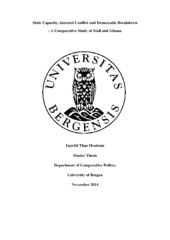| dc.description.abstract | The two underdeveloped, West-African states, Mali and Ghana, have been praised for their well-established democratic institutions, and have been said to be good role models when it comes to democracy in an African context. However, Mail experienced a sudden democratic breakdown in 2012, after violent rebellion and a military coup. This puzzle" is what this thesis is about, and to unravel the underlying structures and causes, a qualitative case study is conducted to investigate how variations in state capacity and internal conflict can help explain the difference in outcome in Mali and Ghana. There is a clear pattern showing in Mali, where incapacity on a range of indicators of state capacity, and an unresolved conflict in the northern region can be said to have caused the democratic breakdown. A more muted conflict level and a higher degree of state capacity is the trend in Ghana, and stands as the reason for why the breakdown happened in Mali, and not in Ghana. | en_US |
